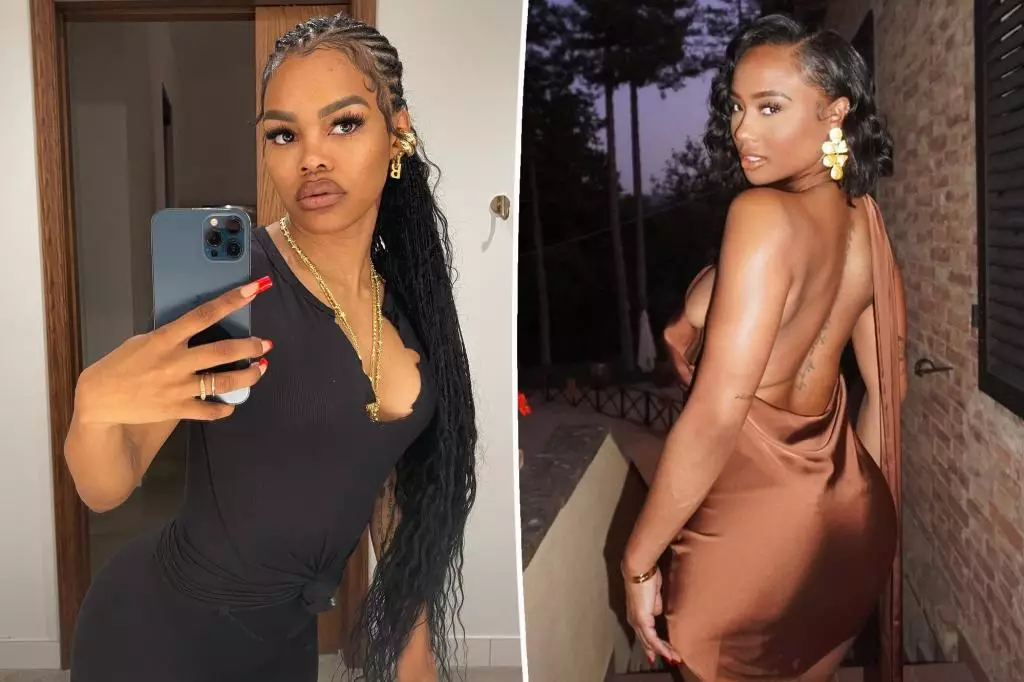The world of celebrity gossip is an ever-turning wheel, particularly when it comes to relationships and the intricate web of personal connections celebrities find themselves entangled in. Recently, the dispute between Teyana Taylor and Kayla Nicole emerged as a riveting narrative that illustrates how past relationships, social media commentary, and pop culture references can culminate in a public spectacle. This article delves into the nuances of the conflict, examining the motivations and implications behind their feud while also touching on themes of fame, jealousy, and the power of representation.
The sparks ignited during a period when Kayla Nicole hinted at dressing up as Teyana Taylor for Halloween—a prospect that would seemingly celebrate one black woman by another. However, the comment took a pointed turn as Nicole casually mentioned being “famous at the time,” referring to her own past as a sports analyst and influencer while seemingly downplaying Taylor’s prominence. In what is now a notable clap-back moment, Taylor responded with a post that referenced Taylor Swift’s 2014 anthem “Shake It Off,” a track synonymous with overcoming negativity. Taylor’s choice of lyric served not only as a clever dig but also as a reminder of the power dynamics that exist even among women with shared identities.
The swift back-and-forth generated considerable buzz on social media, demonstrating how discussions around fame often twist into fierce debates over legitimacy and respect. Following Nicole’s remarks, Taylor expressed more direct condemnation during an episode of Angel Reese’s podcast, “Unapologetically Angel.” She characterized Nicole’s words as uncalled for, insinuating that they were laced with malice. Taylor viewed her comments as an intentional jab, suggesting that Nicole was fully aware of how her words would resonate with the public.
The internet had a field day, swiftly dissecting Taylor’s reaction while casting a critical eye on Nicole’s past comments. It resurfaced long-dormant conversations about the relationship dynamics between celebrity couples and their exes, especially when considering Taylor’s previous relationship with the now-ex-husband Iman Shumpert. The complicated narrative of abandonment accentuated Nicole’s remarks, even as she later apologized or attempted to clarify her intent.
The ensuing skirmish prompted both women to engage in a strategy of public relations, albeit with different tactics. Taylor initially emerged as the vocal critic, implying that Nicole had manipulated their shared identity as women of color for her convenience. This pointed accusation highlighted the poignancy of rivalries in the entertainment industry: they can often betray a deeper sense of solidarity and sisterhood when it comes to public perception.
On the other hand, Nicole’s responses seemed more measured, indicating that she had thought deeply about the implications of her words. She offered insights into her emotional state during the time she made the Halloween costume choice, enunciating feelings of defeat and heartbreak. However, by reiterating that she had learned from her past, she risked being seen as dismissive of the pain Taylor expressed in her reaction.
This saga encapsulates how social media serves as a double-edged sword. While it provides celebrities a platform to engage and connect with fans, it also invites scrutiny, judgment, and a flurry of public discourse that can quickly spiral out of control. Nicole’s subsequent Instagram posts, particularly one set to Beyoncé’s “Formation,” seemingly exuded confidence and poise despite the flak hovering around her. This tactic speaks to an understanding that in the fast-paced world of social media, sometimes the best defense is a good offense, particularly when it comes to matters of self-affirmation.
At the core of this narrative lies a common theme in celebrity culture: the dance of visibility and invisibility in relationships and conflicts. Teyana Taylor and Kayla Nicole, despite their differing approaches to the situation, represent a broader commentary on women’s roles in the public eye. Whether through critique or self-promotion, the need to assert agency is palpable. Looking beyond the immediate conflict, this incident raises profound questions about how women in the entertainment industry navigate their identities, both personal and professional when faced with similar circumstances.
The complex exchange between Teyana Taylor and Kayla Nicole serves as a microcosm of larger social dynamics. Their ongoing interaction not only reveals individual motivations behind public statements but also challenges the idea of solidarity among women, even when faced with shared experiences. As each woman carves her own path forward, the lessons learned from this episode resonate far beyond their individual stories, inviting discussions about respect, representation, and the ways we communicate in an interconnected world.


Leave a Reply